New Delhi: Eliminating “high-staking” of entrance exams (assessment with important consequences), transitioning to aptitude-based tests like SAT, revisiting the NIRF mechanism as it is introducing “distortion” into the system, and ensuring the timely filing of leadership posts in higher education institutions, were among suggestions made by academicians during the annual Visitor’s Conference 2024-25.
The two-day conference, organised by the President of India in their role as the Visitor to central universities and higher education institutions, concluded Tuesday at Rashtrapati Bhawan.
It was attended by vice-chancellors of central universities, directors of IITs, IIMs, NITs and IISc, besides senior officials from the Ministry of Education, UGC, AICTE, and other key stakeholders.
The last day of the conference witnessed session on five themes including flexibility in academic courses, credit sharing and credit transfer with multiple entry and exit options; internationalisation efforts and collaboration; converting research or innovation into useful products and services; effective student selection processes and respecting student choices in context of NEP; and effective assessments and evaluation.
The outcomes of the discussions held by academic panels at the conference were presented to President Droupadi Murmu during the closing session, with Union Education Minister Dharmendra Pradhan in attendance.
Also Read: In UGC’s draft anti-discrimination norms, equity panel, de-recognition of non-compliant institutions
‘Too many’ and ‘high-stake’ entrance exams
Presenting the concluding remarks for the session on effective student selection processes, IIT Kanpur director Manindra Agrawal said the challenges are manifold when we look at selection of undergraduate examinations as there are “too many,” adding that “high-stake” entrance examinations and coachings have become a real burden.
“There are also questions that we really need very specific subject-based examination, many of the institutions are hampered by late declaration of results,” Agrawal said while making a presentation.
He also stressed the need for “low staking of examinations” and reducing the burden of coaching. “This was part of the recommendation of the NEP 2020 also that we should aim to transition to last or linear on the flight testing model, which is essentially an aptitude-based test which can be adopted so that it can be taken anytime, and anywhere by students.
“There are a number of studies for SAT (Scholastic Assessment Test), which is a similar examination, which show that after 30-40 hours of coaching, the impact of coaching becomes minimal.”
He also recommended removing the 75 percent marks cap in Class 12 for admission to NITs in the Northeast. Additionally, he highlighted mental health issues among students and faculty as a major challenge, emphasising the need for collective action to address these concerns.
The IIT Kanpur director further stated that the National Institutional Ranking Framework (NIRF) mechanism “perhaps needs to be looked at,” adding that it is “introducing distortion into the system”.
“A number of institutions are simply trying to gain the parameters, because certainly not the intent (of NIRF),” he said in his remarks.
“The intent was to identify the institutions that are doing well, identify their strengths and also weaknesses, so that they can focus on their weaknesses. So maybe there is a need to review the way an NIRF ranking is done and take appropriate measures,” he said.
He also highlighted that many institutions face challenges in implementing various initiatives because academic leadership is not immediately available. “There will also be delays in the appointment of those, so that is something that we request the ministry to take note of,” he added.
Branding of higher education institutions
Delivering the concluding remarks on the session focused on internationalisation efforts and collaboration, UGC Chairperson M. Jagadesh Kumar shared some key insights. He highlighted the idea of incorporating Indian knowledge systems into the education curriculum.
“One of the ideas that emerged was to introduce, for example, Indian knowledge systems as part of our education. Additionally, more Indian case studies need to be included—such as the recent large gathering of people at the Kumbh Mela, which could serve as a case study. Also, the way we managed the COVID-19 crisis. There are many more Indian case studies that should be introduced into our higher education system,” he said.
Kumar also stressed the importance of branding India’s higher educational institutions. “Groups of vice-chancellors and heads of institutions should visit countries in the Global South to promote Indian higher education.”
Flexible curriculum, credit transfer
In his concluding remarks on the session focused on flexibility in academic courses, Anand Bhalerao, Vice Chancellor of the Central University of Rajasthan, discussed several key challenges that need to be addressed.
“One of the main challenges we identified is institutional readiness. Many universities still operate within rigid frameworks and require significant restructuring to adopt a more flexible curriculum. Establishing partnerships and aligning systems for credit mobility, technology integration, and transfer is crucial. Additionally, digital platforms supporting credit transfer, such as the Academic Bank of Credits, need to be globally integrated with robust security measures,” he explained.
In his recommendations, Bhalerao emphasised the need for a comprehensive policy and regulatory framework, the development of digital infrastructure for credit transfer, and strengthening university collaborations. He also highlighted the importance of capacity building for faculty and administrators, raising student awareness and engagement, and fostering industry collaborations for skill development.
(Edited by Amrtansh Arora)
Also Read: What is DU’s two-phase DUSU elections proposal and why students & faculty are opposing it






